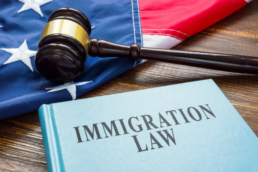Obtaining a U.S. Green Card is a two-step process. The first step is filing either an I-130 or I-140 petition. The Form I-130 is designated for family members who are filing on behalf of their foreign national relative, while the I-140 is reserved for employers sponsoring a foreign national employee.
The second step of the immigrant visa process is asking the government to create an actual green card for the applicant. There are two ways to do this: (1) Adjustment of Status, which can be used to apply for lawful permanent residency (green card) when the applicant is present in the U.S.; and (2) Consular Processing, which is used to apply for a green card when the applicant is outside the U.S. Both methods of filing have advantages and disadvantages, and a decision should be made based on the applicant’s location at the time of filing, future travel and work plans, and the individual’s preference for processing.
The chart below provides a broad overview of the two available options.
Please note: This information should not be considered comprehensive or applicable to any individual case. Information specific to individual cases can be obtained through consultation with an attorney at our firm. For more information, please visit our website.
| Consular Processing | Adjustment of Status | |
| Availability | Available to individuals who are inside or outside the U.S. | Available only to individuals who are currently present in the U.S. |
| General Overview | Allows an individual to apply for a green card at a U.S. Consulate abroad and enter the U.S. as a permanent resident. | Allows a foreign national, who is legally residing in the U.S., to adjust their current status to that of a legal permanent resident. Involves filing a Form I-485 either concurrently with Form I-130 or I-140 (only available in certain cases) or upon approval of Form I-130 or I-140. |
| Government Fees (subject to change) | May be cheaper: The current government filing fee for Form I-130 is $535. The current filing fee for Form I-140 is $700. Consular processing also involves additional fees throughout the process in the amounts of $325, $120 and $165. There is also a fee for the medical exam, which varies per doctor. Travel expenses should also be considered. | May be more expensive: Involves paying I-130 or I-140 filing fee plus an additional $1,225, which covers the I-485, Application to Register Permanent Residence or Adjust Status, filing fee ($1,140) and the biometric services fee ($85). There is also a fee for the medical exam, which varies per doctor. |
| Processing Times | Faster: Usually around 5 to 13 months. | Slower: Usually around 12 to 24 months. |
| Dependents | Unmarried dependent children under the age of 21 may be included on the initial I-130 or I-140 petition. Separate forms are not required. | Form I-485 must be filed individually for each dependent. |
| Travel & Work Authorization | No benefits available while application is pending. Once granted permanent residency, however, the individual is permitted to work and travel as a green card holder. | EAD and Advance Parole available while application is pending. Once Form I-485 is filed, however, the applicant is not permitted to depart the U.S. or work until travel authorization, also known as Advance Parole, is issued and employment authorization is granted. These documents are usually issued within 60-90 days after the application has been submitted. |
| Procedure | Once the Embassy is notified that an immigrant visa is available, an interview occurs at the Embassy or Consulate. The applicant must attend a medical examination before the interview. If approved, the applicant is admitted as a Lawful Permanent Resident. | I-130 or I-140 is filed with appropriate USCIS Service Center. Once a visa becomes available, the applicant can file Form I-485. After I-485 is filed, the applicant will be notified about a biometrics service appointment. The applicant must also undergo a medical exam. An interview is also required. |
| Conditional Permanent Residence | In most marriage-based cases, if you and your spouse have been married for less than 2 years at the time of the interview, the applicant’s permanent residency is issued on a conditional basis. A petition must be filed 90 days prior to the two-year anniversary of the granting of the green card. Failure to do so will result in revocation of the green card. | |
If you are interested in applying for a green card and would like to explore your options, please contact our office to schedule a consultation with one of our attorneys today!
Ready to have Berardi on your side?
Whether you’re a business looking to hire or a professional hoping to relocate, immigration law can be complicated. But you don’t have to do it alone. Put our experience to work for you.



